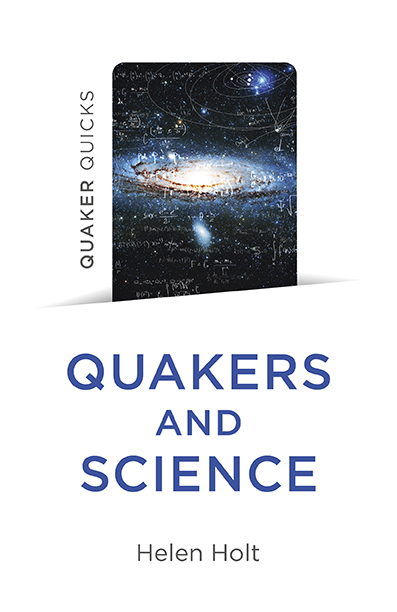Quaker Quicks - Quakers and Science
An introduction to some ground-breaking Quaker scientists and an exploration of some of the resonances between science and Quakerism

An introduction to some ground-breaking Quaker scientists and an exploration of some of the resonances between science and Quakerism
An introduction to some ground-breaking Quaker scientists and an exploration of some of the resonances between science and Quakerism
Philosophy & social aspects, Quaker, Religion & science
Quakerism has a rich tradition of engaging science and has produced many notable amateur and eminent professional scientists in fields ranging from psychology to physics. Quakers and Science discusses some of the historical reasons why Quakers embraced science, introducing ten 20th-century Quaker scientists to explore the intriguing resonances between science and Quakerism. The distinctive Quaker emphasis on deeds not creeds inspires Quaker scientists to be particularly interested in the ethical questions raised by science. And the emphasis on continual revelation implies that Quakers have welcomed the opportunity to reformulate their religious beliefs in the face of new scientific discoveries.
Click on the circles below to see more reviews
My own interest in Quakers and science was piqued over a decade ago when my wife, Diane (a science educator), and I met internationally famous, Quaker, astrophysicist Jocelyn Bell Burnell at a Friends Association for Higher Education conference at Woodbrooke Centre in the UK. During her plenary speech, Dame Bell Burnell shared some of the challenges she faced during her journey, as a young woman, forging a path to a scientific career. She also indicated that her Quaker faith was a source of strength throughout and that it was quite compatible with the questioning perspective demanded by rigorous scientific investigation.* Given this connection, I was especially pleased when scanning the table of contents, I noticed that Jocelyn Bell Burnell is one of ten, 20 th century Quaker scientists that Holt profiles. The others constitute a Who’s Who of Quaker researchers and teachers; starting with Silvanus Phillips Thompson, including (among others) Rufus Jones and Howard Brinton, and concluding with Ursula Franklin and Dame Bell Burnell. Prior to these interesting micro-biographies, Holt’s first chapter: "…gives a broad overview of how Quakers viewed and practised science from the movement’s beginnings until the Manchester Conference of 1895, an event that saw British Quakerism (and a significant strand of American Quakerism) begin to move towards a deliberate engagement with science and other aspects of ‘modern thought’." She concludes with a set of reflections reinforcing themes that repeatedly appear, including; social responsibility, openness to new expressions of faith, the importance of personal experience, and perceiving “…no sharp distinction between religious and scientific approaches to life.” Seeing the Quaker concept of “the Inner Light” underlying all of these common themes, Holt emphasizes their relevance to modern climate science, arguing: "Quaker scientists today thus have a heritage that includes taking a stand for the right use of science and seeing a close connection between the scientific and spiritual worlds. In the face of the current climate crisis, these insights may well prove invaluable." Throughout the book there are valuable, briefly annotated Further Reading sections. There is also a substantial Bibliography. Overall, Helen Hunt provides a clear, informative and readable introduction to an interesting and important, but previously under-reported, area. I’ll be recommending it to all my scientifically-inclined Friends. ~ Donn Weinholtz - Emeritus professor of educational leadership at the University of Hartford
At all times a highly readable, smooth-sailing prose, and one that even teaches us how to be socially responsible human beings, if we so choose to, Quaker Quicks - Quakers and Science is one of the most eye-opening and thought-provoking books that has been released on the subject to hand in a long time, in my humble opinion. ~ Exclusive Magazine, Review
This book makes a strikingly original contribution to the science-and-religion debate. Through a series of bite-sized biographies Helen Holt explores the distinctive approaches that Quaker scientists have brought to their scientific work. Emphasising shared commitments to social justice, pacifism, experience and the Inner Light, Holt paints compelling and human portraits of both Quakerism and science. This book stands out as an important milestone in studies of science and religious faith. ~ Mark Harris, Professor of Natural Science and Theology, University of Edinburgh
My formal scientific education ended with O-levels in 1955 but I have been aware for most of the 40-plus years that I have been a Friend that individual Quakers have over the years made significant contributions to the advancement of scientific knowledge and increasingly aware of the fact that the Quaker approach to religion is very much in tune with the scientific method. How good it is, then, to have this spelled out for me in this little volume, which I found to me very readable, informative and, beyond that, inspiring. I hope that it will be widely read and not only by Quakers. It should have a prominent place in Quaker outreach work and, of course, in every meeting house library. ~ Phil Lucas, ex-clerk of Quaker Life Central Committee
A highly insightful account of 10 prominent Quaker scientists who have exhibited a wide range of diverse and creative reactions to the issues of science and religion, as well as how to be a socially responsible human being. Together they present Quakerism as an attractive and open-minded force for good in the world. ~ Eric Priest, FRS, St Andrews University
This clear and helpful book explains how Quakers have brought together science and religion, not without some struggles but often joyfully and productively. Giving short biographies of a range of Quaker scientists from the early twentieth century up to today, Helen Holt shows how scientific work shaped their religious understandings and how their religious commitments, especially to pacifism, affected their careers. ~ Rhiannon Grant, author of Hearing the Light and other Quaker Quicks books